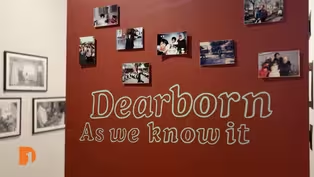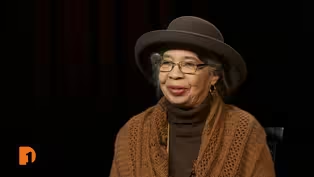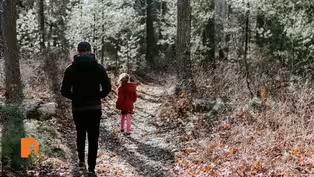
Detroit Jazz Festival 2025 Artist-in-Residence Jason Moran leads workshop for Wayne State University students
Clip: Season 9 Episode 43 | 7m 36sVideo has Closed Captions
One Detroit contributor John Penney talks to Detroit Jazz Festival artist-in-residence Jason Moran.
Acclaimed pianist and composer Jason Moran, the 2025 Detroit Jazz Festival artist-in-residence, held a workshop for jazz students at Wayne State University. One Detroit contributor John Penney of 90.9 WRCJ attended the workshop and talked with Moran about Detroit jazz legacy, the rhythm that defines its sound, and how the city’s unique music style continues to inspire his work.
Problems playing video? | Closed Captioning Feedback
Problems playing video? | Closed Captioning Feedback
One Detroit is a local public television program presented by Detroit PBS

Detroit Jazz Festival 2025 Artist-in-Residence Jason Moran leads workshop for Wayne State University students
Clip: Season 9 Episode 43 | 7m 36sVideo has Closed Captions
Acclaimed pianist and composer Jason Moran, the 2025 Detroit Jazz Festival artist-in-residence, held a workshop for jazz students at Wayne State University. One Detroit contributor John Penney of 90.9 WRCJ attended the workshop and talked with Moran about Detroit jazz legacy, the rhythm that defines its sound, and how the city’s unique music style continues to inspire his work.
Problems playing video? | Closed Captioning Feedback
How to Watch One Detroit
One Detroit is available to stream on pbs.org and the free PBS App, available on iPhone, Apple TV, Android TV, Android smartphones, Amazon Fire TV, Amazon Fire Tablet, Roku, Samsung Smart TV, and Vizio.
Providing Support for PBS.org
Learn Moreabout PBS online sponsorship(jazz music) - [Jason] What's happening on the bass?
- Yeah.
- Oh.
(musician speaks indistinctly) - Yeah, it's like a- - Make that sound now.
- Okay.
- [Jason] Yeah.
(jazz music continues) - I'm here this afternoon with the Artist-in-Residence for the 46th Annual Detroit Jazz Festival, Jason Moran.
- It's a pleasure and honor to be back in this city, and also to be here to share more music with this city.
So, I'm completely honored.
- Well, talk a little bit about what this city means to you, and what the festival means to you.
- I grew up in Houston, Texas.
And when I was in high school, I went to a performing visual arts high school, and there was a band of students who came from the New School in New York City to try to recruit people.
- Yeah.
- And in this band, was a young piano player, named Carlos McKinney.
And Carlos McKinney is of the famous, what I learned, famous McKinney family of musicians.
And I remember meeting him and being like, "Oh my god, who was that?"
And it was something about meeting a musician from Detroit.
He was like the first musician I met from Detroit.
And then, every musician I met from Detroit, they told me they were from Detroit.
And you heard it in the way they sound.
You heard it in the way they talked.
And you heard it in the way they played.
And so, I know this city creates such an environment that it sprouts all these musicians, all these really creative thinkers, who think about history, they think about progress, and they make it.
So, when I come back here, I feel like I'm playing to the community that creates these great musicians.
And it's always an honor to be in front of a Detroit audience.
- So, really, when you say that you can "hear Detroit" when you're listening to these Detroit musicians, what exactly are you hearing?
- You know, like, let's say a certain bounce.
(laughs) There's a certain bounce that Motown has.
There's a certain bounce that techno has.
There's a certain bounce that Geri Allen had when she sat at the piano.
- Yes.
- Right?
The bounce is like inherent to the nature.
And every city has a different lean on the bounce, you know?
And, it's a texture of the rhythm.
And when I think about the saxophone players, I'm thinking like James Carter and JD Allen, like, they play with such broad tone, you know?
And also, broad spectrum about what they think music is, too.
And so, this is an open city, you know?
It's an open city.
Is it a metaphor that it sits at the border, you know?
Like, it sits on the water, you know?
There's so much about the fabric of this city that gets met in these musicians.
But that bounce is one thing that I always kind of love.
And of course, I couldn't come to Detroit without saying J Dilla and what he meant to kinda revolutionizing the feel of a rhythm.
And it's a thing that has impacted the world.
(Jazz music concluding) Right, okay, good.
For me, sometimes, when I hear like sections like that, then just as an experiment for me in my process, I want to hear what happens when we leave the logic of like, harmony having its own momentum.
What if we disrupt that logic?
It's important to test, just to make sure that you're kinda out here feeling the music and learning it in a way that you also know that you can adapt it, right?
Like, you all should all have different versions of the way you hear this song, and say, "Oh, if I was gonna do this song, I'd try it like this."
- And you made a very clear point of it during the workshop today about listening to music.
And almost all of the great musicians who I've talked to over the years say the most important lesson you learn in schools, everybody wants to be a soloist and be out front, but the most important thing you have to learn is when to lay out.
- Yeah.
(laughs) - And when to listen.
- Yeah.
Yeah, it's a practice, as we say.
It's a practice.
If you wanna know what you sound like, you gotta record yourself.
You gotta spend time and listen back to it.
You gotta critique yourself.
The reason it came up is we were talking about guitar stuff.
And I asked him if he recorded his solos, 'cause I thought they were great.
But he would hear some things.
It's a thing we do.
We're here to study music, not play it.
We're here to study it.
And we're trying to study intuition.
That's not written anywhere.
That like comes from you all.
These decisions you make in the moment, they happen like (snapping).
That's your mind working.
- So, I gotta ask you about the workshop that you just did with Wayne State Kids today.
You're a renowned educator.
When come to a workshop like that, how do you approach it?
And what do you hope that those kids take away?
- I want students to know about flexibility.
I think, you know, we're studying this music because there's a certain inherent nature that allows you to be flexible, to be responsive, and to respond, and act, you know?
To take something in, digest it, respond.
And then, the quicker that gets, I wouldn't say "the better you get."
(chuckles) But at least you get that practice in.
And so, sometimes, with a ensemble like this, which is working in a big band environment, it can get very into habit.
And so, I wanna make sure that they notice their habits, that they listen to them, but they're able to adjust them, too.
And that adjustment is kinda like, it's actually what you get hired for.
It's in our attitude.
It's what do we think is fresh, you know?
How do we try to make sure that we keep it fresh?
I still feel like the way the backgrounds come, they sound like a broken record after three times of hearing the backgrounds come in behind every solo.
I don't think they should be behind every solo.
I think one solo should be with, I actually think one solo should be a totally new form.
The second solo should be on a new form.
- So as the Artist-in-Residence this year, what are you bringing to the festival?
- I'm excited because a few things I feel like, I kinda know I wanna bring my friends back, who I've come here frequently with.
Nasheet Waits, the great drummer, and Taurus Mateen, the great bassist.
They have been my Bandwagon band for now 26 or 27 years.
And we're bringing along with the Bandwagon, Meshell Ndegeocello, the great singer and bassist, along with Akili Bradley, a young trumpeter, and she's from Monterey, California, who's been playing with the Bandwagon recently.
So we're bringing that ensemble, which is quite exciting.
- That's very exciting.
- The second is a group dedicated to Duke Ellington's big band music.
And I've spent the past year traveling a Duke Ellington show around the world, pivoting between sometimes solo, sometimes big band show.
But the big band shows allow me to meet musicians who are local.
And so, I'm playing this show with people who are here in the city.
And like, I get to meet 17 new people and play with them.
And pull Duke's music forward, and learn how to play it together.
And then, we will present that.
That's gonna be a nice little fun night.
And I'd say the third event is a tribute to techno music of Detroit.
And I've invited the great musician and techno artist, Jeff Mills, to do a duet with me.
And Jeff Mills has worked with many improvisers.
He has a certain kinda sensitivity in making music on the spot.
And I saw him perform in France maybe 10 years ago.
And I've been stuck with how he makes sound.
And to join our duet is the great poet, Jessica Care More.
- Oh wow.
- And so, we will be three JMs: Jason Moran, Jeff Mills, and Jessica Care More.
(chuckles) - Oh, that's awesome!
- Presenting a trio.
And so, I'm excited about that, because that will be brand new for me.
(drum fill) (music concludes)
Arab American National Museum’s David Serio details the history of Arab immigration in Michigan
Video has Closed Captions
Clip: S9 Ep43 | 7m 2s | One Detroit’s Sarah Zientarski explores the history of Arab immigration in Michigan. (7m 2s)
Detroit native Dr. Melba Joyce Boyd named Michigan’s thirdpoet laureate
Video has Closed Captions
Clip: S9 Ep43 | 5m 45s | Dr. Melba Joyce Boyd discusses being named the new Michigan Poet Laureate. (5m 45s)
One Detroit Weekend | Things to do around Detroit this weekend: April 25, 2025
Video has Closed Captions
Clip: S9 Ep43 | 1m 43s | One Detroit contributor Haley Taylor of 90.9 WRCJ shares some events coming up this weekend. (1m 43s)
Providing Support for PBS.org
Learn Moreabout PBS online sponsorshipSupport for PBS provided by:
One Detroit is a local public television program presented by Detroit PBS














